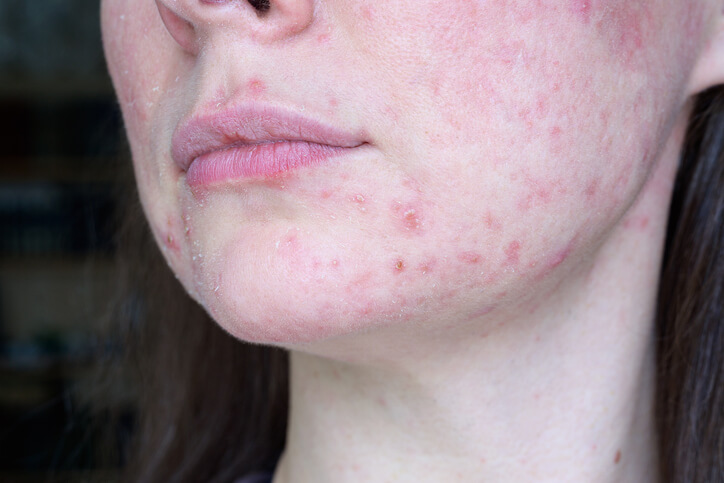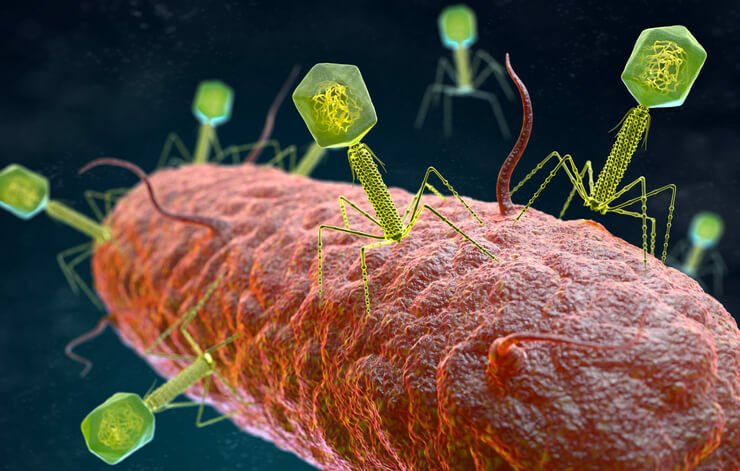Reduced acne bacteria (i.e. P. acne) can result in clear skin. However, have you ever wondered, what is in acne medication, especially those used to kill acne bacteria?

What I want to share with you is a recent acne formulation based on scientific research and clinical proof. It’s the product of a biotech company and not just a beauty company. Their products are considered SAFE and NATURAL!
The product is called Phyla. Its based on PHAGE, also referred to as BACTERIOPHAGE!
Bacteriophages are viruses that infect and kill bacteria. They are part of the defense “soldiers” in your skin and are the major constituent of the human microbiome.
In my previous content titled “do probiotic help acne?“, I shared with you why it’s important to have a healthy and balanced microbiome and the role that probiotics play in that. If you are interested, you can check out that article via the highlighted link.
In this article I’ll cover the remarkable breakthrough about bacteriophage being used in topical formulation to target and kill P. acne (an acne causing bacteria). However, let’s quickly review conventional acne medication.
Regular Acne Medications
If you suffer from acne, it’s more than likely that you have come across the common topical or oral acne medications that your doctor may prescribe for you. These common acne medications include Antibiotics, Benzoyl Peroxide and Retinoids.
Antibiotics and their side effects

I was taught in my microbiology class that Prof. Alexander Flemming discovered the first actual antibiotic called Penicillin in 1928, but that’s BESIDE the point. In essence, the use of antibiotics has been around for a long time. However, its use for acne treatment has been around for 40+ years.
While antibiotics have been a life saver for so many and can help to get rid of many bacterial infections, some problems have been associated with its use including development of “superbugs”, superinfections and gut disturbance (e.g. loose stool).
In case you are new to these fancy words, I’m happy to explain.
Superbugs may occur due prolonged antibiotic use, especially broad spectrum antibiotics.
As for superinfections and gut disturbance, these occur because antibiotics may kill both the good and bad bacteria. So when good bacteria that fight of other harmful organisms are killed, you can come down with superinfections (secondary infections) such as candidiasis. If the good bacteria that aid digestion in your gut are killed, you may start to have a mild form of diarrhea (loose stool).
What about Benzoyl Peroxide?
You can find Benzoyl Peroxide (BPO) over the counter in moisturizers or as a prescription medication depending on the concentration.
BPO does some NICE things like killing bacteria, reducing excessive sebum and free radicals. Its ability to kill bacteria is mainly because it can cause oxidation of bacteria protein. In addition to killing and reducing the population of P. acne, it can also help to reduce excessive sebum secretion as well as free fatty acids.
BPO will not disturb the microbiome of your skin and you also don’t have the problem of developing superbugs. Unlike antibiotics BPO can be used long-term..
The problems associated with the use of BPO is that you may experience mild dryness, scaling and redness at the site of application, except in rare cases when these problems are severe.
Since BPO is also a bleaching agent, it may bleach your hair or colored clothes you are wearing.
Retinoids
Oral and topical Retinoids are very effective against acne. Depending on your severity of acne, Retinoids that your doctor will likely prescribe for you include Retinol (topical), Tretinoin (topical) and Isotretinoin (oral form branded as Roaccutane, Accutane etc.).
When you are using Retinoids, it may get worse before it gets better. The benefits of Retinoid are limited by its unwarranted side effects and reactions. Some local side effects include dryness, itching, peeling, redness, stinging and scaling which generally improve over time.
You may also become prone to sunburn due to skin irritation and peeling.
Systemic severe effects include hair loss, headaches, teratogenicity (ability to cause birth defects) etc.
Although disturbance in the skin microbiome may not be an issue with Retinoids, relapse has often been reported by many of its users following remission and stoppage of treatment.
To reduce these side effects, your dermatologist should provide you with strategies to reduce local side effects.
Who’s behind this breakthrough?
Phyla is not just a beauty company, it’s a biotech company that utilizes science to manufacture high quality cosmeticeutical products. Its products are natural, environmentally friendly, cruelty and fragrance free and non-animal tested. They are also vegan friendly and nut free.
In order to ensure that the quality of their products are unbeatable, they follow several pharmaceutical guidelines even if they are not required to do so when it comes to cosmeceuticals.
The ingredients they utilize are all vegetable based. None of its ingredients is on the list of the multiple banned ingredients in both the US and Europe.
They are an official partner of the University of California San Francisco.
The Breakthrough: Phylabiotics
Phyla cleanser, serum and moisturizer are based on a key ingredient called P. acne bacteriophage. Other ingredients include glycerin, squalene and tocopherol.
P. acne is a type of bacteria that plays a major role in the appearance of acne. P. acne generally resides in the skin as part of your skin microbiome in preventing harmful microbes. The strain of P. acne strain in healthy individuals is different from the type you’ll find in individuals with acne affected or acne prone skin.
P. acne bacteriophage is a virus that can specifically kill P. acne by residing inside P. acne and killing it without transferring the genetic materials of P. acne. So this means that you will not encounter the problem of antibiotic resistance that’s associated with antibiotic therapy or some strains of bacteriophage.
P. acne bacteriophage obtained from P. acne in healthy individuals confers health benefits and reduces the appearance of acne.
Phyla biotics utilize P. acne bacteriophage that’s isolated from healthy individuals. The benefits you’ll get from this particular P. acne bacteriophage include reduction in P. acne, reduction in excess sebum production, prevention of comedone (whitehead and blackhead) and improvement of inflammatory acne.
Phyla products claim that their products can achieve 90% reduction in acne, enhance the microbiome balance by 50% and have no side effects.
Overcoming the Challenges with Phage Therapy
You may be wondering why phage therapy hasn’t replaced antibiotics or adopted by medical science as a mainstay therapy. The reality is that there have been some challenges with using phage as a therapy in place of antibiotic therapy.
I have presented below some of these challenges with phage therapy. What I have also tried to do is to look at how phyla has been able to overcome these challenges in preparing their anti-acne specific products.
Some challenges with phage therapy include;
- Some bacteriophage can cause superbugs to develop
- Bacteriophage is prone to being destroyed by certain environmental conditions
- Finding the type of phage that can be used to treat a specific infection may be difficult
- Preparing phage therapy can be difficult etc.
How phyla overcame the challenges;
Phyla products are cosmeceutical products that promise to clear acne using P. acne bacteriophage. Although phage therapy is not yet medically approved as a therapy for acne due to several challenges, Phyla overcame some challenges to come up with their products.
Here are some ways Phyla overcame certain challenges associated with the use of bacteriophage;
- Phyla uses P. acne phage – P. acne phage does not transfer the genetic material of bacteria that can result in resistant strain, hence it does not cause superbugs.
- They recommend you refrigerate. This ensures that their products remain potent the entire time.
- Phyla formulated its products based on scientific research and clinical proof. One of the clinical proofs was that P. acne bacteriophage from healthy individuals killed P. acne without any damage to skin microbiome or side effects. Significant results were seen at 8 weeks.
- Phyla was able utilize biotechnology to manufacture this natural cleanser, serum and moisturizer based on this science.
Conclusion: The future
Without wanting to sound prophetic, I can see a future where alternatives such as phage therapy will completely replace antibiotics therapy prescribed by doctors. I’m talking not only in terms of replacing antibiotic therapy for acne but all bacterial infections. Science is edging closer and closer to that point where all the identifiable challenges can be overcome.
Small steps taken by companies like Phyla are a good indication that it is very likely that antibiotics therapy will be replaced one day. Such small steps, though a breakthrough (by Phyla) in formulating cosmeceutical products that are scientifically researched and clinically proven to be effective against P. acne is commendable.
What you benefit from this cosmeceutical product by phyla is that it will kill P. acne and significantly reduce the appearance of acne in 8 weeks. It also has no side effects, and helps to restore and enhance the skin microbiome.
Was it an interesting find? If you think it is, leave a question on what you’ll like to know more about or comment on how you feel about the breakthrough and prospects of bacteriophage in the treatment of acne!
References
Colavecchio, A., Cadieux, B., Lo, A., & Goodridge, L. D. (2017). Bacteriophages contribute to the spread of antibiotic resistance genes among foodborne pathogens of the Enterobacteriaceae family–a review. Frontiers in Microbiology, 8, 1108.
Dréno, B., Dagnelie, M. A., Khammari, A. et al. (2020). The Skin Microbiome: A New Actor in Inflammatory Acne. Am J Clin Dermatol 21, 18–24. https://doi.org/10.1007/s40257-020-00531-1
Jończyk-Matysiak, E., Weber-Dąbrowska, B., Żaczek, M., Międzybrodzki, R., Letkiewicz, S., Łusiak-Szelchowska, M., & Górski, A. (2017). Prospects of phage application in the treatment of acne caused by Propionibacterium acnes. Frontiers in microbiology, 8, 164.
Kawashima, M., Nagare, T., & Doi, M. (2017). Clinical efficacy and safety of benzoyl peroxide for acne vulgaris: comparison between Japanese and Western patients. The Journal of dermatology, 44(11), 1212-1218.
Matin T, Goodman MB. (2021). Benzoyl Peroxide. In: StatPearls [Internet]. Treasure Island (FL): StatPearls Publishing; 2022 Jan-. Available from: https://www.ncbi.nlm.nih.gov/books/NBK537220/
Phyla Skincare (2022). Phylabiotics. Available from: Phage Technology for Acne Care – Phyla Skincare (phylabiotics.com)
